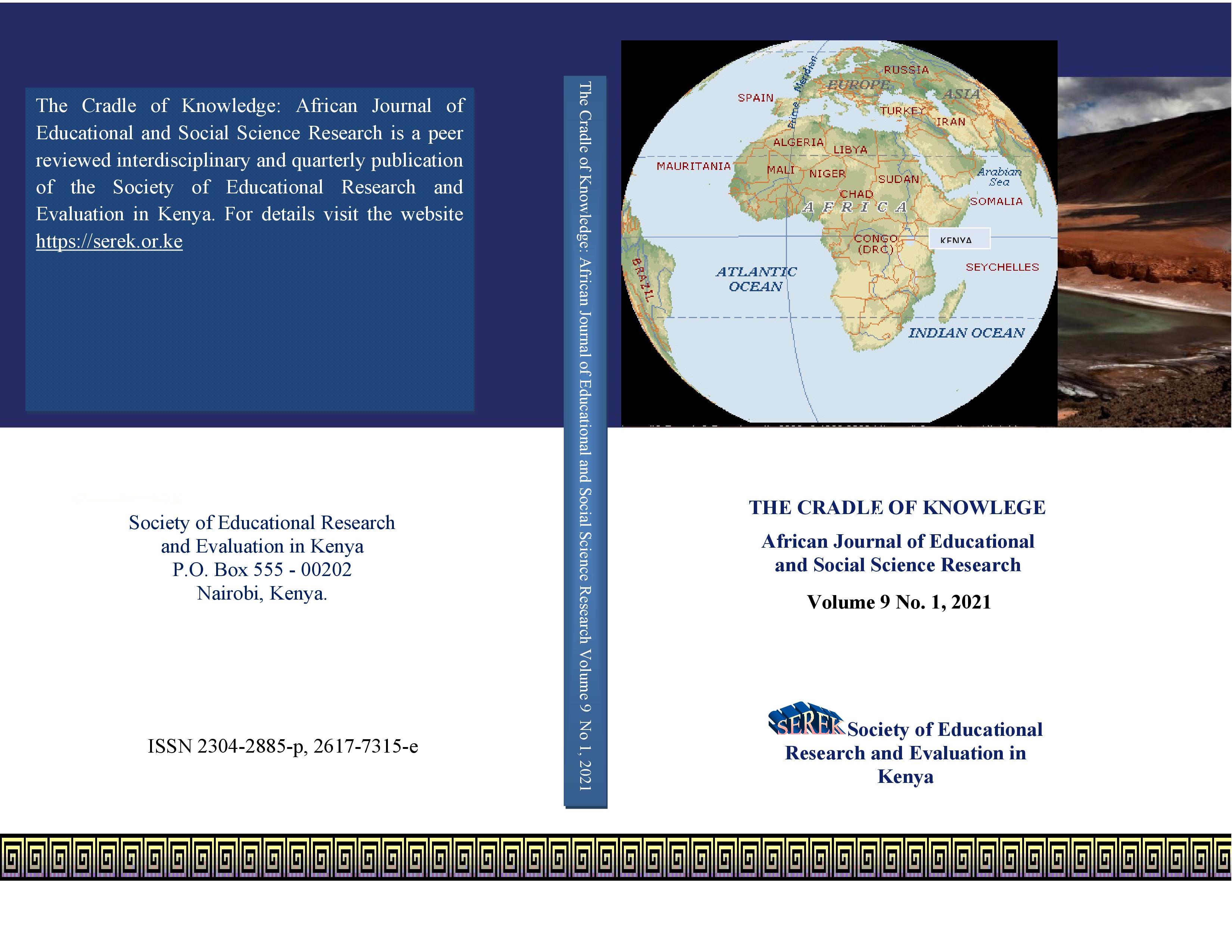
Managing High Quality Virtual Learning in Response to Covid-19; Learner and Faculty Preparedness, Inhibitors and Mitigations in Kenya’s Higher Education
Abstract
Globally and Kenya in particular, the initial and sudden riposte to the COVID-19 disease was immediate shift of almost every course to virtual setting in substitution of face-to-face teaching as a remedy to minimize transmission of the disease, but many learners and faculty members were not prepared to learn and teach online. Higher learning institutions engaged in this significant change will require providing significant and constant assistance to learners and faculty to their learning management systems (LMS) for effective management and delivery of virtual learning. Perspectives on learner, faculty, and institutional preparedness and their associated challenges in view of mitigating them will assist institutions better realize their pre-COVID-19, Covid-19 and post Covid-19 status of their faculty, learners, and institutions themselves. Visible Learning theory which underscores the essence of the learner and the teacher, knowing what to do and how to do it in a teaching and learning process guided this perspective. This being a theoretical study, it utilized document examination as a method of qualitative research where documents are interpreted by the interested scholar to give meaning and voice in an assessment topic. The study collected information from published articles on virtual learning covering information about Kenya and other countries. The study employed purposive random sampling strategy as it only reviewed articles that were concerned with virtual learning. The review established that both staff and learners are inadequately prepared on e-learning. Significantly the review findings will inform policy and decision making to ensure that policy responses and measures expressly address questions on virtual learning preparedness.
Keywords: Managing, Quality, Virtual, Learning and COVID-19
Full Text:
PDFReferences
Abidjan, T. (2020). With Lockdowns Africa Gears up for Remote schooling; Daily Nation April 24th Nation Media Group, Nairobi, Kenya.
Areba G.N. (2020). COVID-19 Pandemic Impact on Kenyan Education Sector: Learner Challenges and Mitigations; Journal of Research Innovation & Implications in Education ISSN 2520-7504 (Online) Vol.4, Iss.2, 2020 (pp. 128-139)
Ashley A. Smith. (2019). “What Community College Students Say Impedes Their Progress,” Inside Higher Education.
Berge, Z.L. (1998). Barriers to online teaching in post-secondary institutions: Can policy changes fix it? Retrieved October 19,2003 from http://www.westga.edu/~distance/Berge12.html
Bonk, C.J. (2001). Online teaching in an online world. Retrieved August 20, 2020, from
http://www.courseshare.com/reports.php
Christopher Brooks and Susan Grajek. (2020). EDUCAUSE research on student, faculty, and institutional readiness for online learning 2020 D. Christopher Brooks and Susan Grajek;
https://er.educause.edu/blogs/2020/3/faculty-readiness-to-begin-fully-remote-teaching
Chizmar, J.F. & Williams, D.B. (2001). What do faculty want? Educause Quarterly, 1, 18-24.
Dooley, K.E. & Murphrey, T.P. (2000). How the perspectives of administrators, faculty and support units impact the rate of distance education adoption. Retrieved on October 26, 2003 from http://www.westga.edu/~distance/ojdla/winter34/dooley34.html
Hattie, J. A. (2012). Visible Learning for Teachers. Maximizing Impact on Learning. London. UK. Routledge.
Joseph D. Galanek and Dana C. Gierdowski (2020) ECAR Study of Community College Faculty and Information Technology.
https://er.educause.edu/blogs/2020/5/ecar-study-of-community-college-faculty-and-information- technology-2020
Jones, A.E. & Moller, L. (2002). A comparison of continuing education and resident faculty attitudes towards using distance education in a higher education institution in Pennsylvania College and University Media Review, 9 (1), 11-37.
Lumumba, P. O. (2020). Higher education – The lifeblood of development
https://www.universityworldnews.com/post.php?story=20200526102859360.
MoE (2018). Education Sector Disaster Management Policy 2018.Nairobi, Kenya.
MoE (2018). Sessional Paper on Reforming Education and Training for Sustainable
Development 2018. Nairobi, Kenya.
Mohamedbhai, G. (2020) COVID-19: What consequences for higher education?
https://www.universityworldnews.com/post.php?story=20200407064850279.
Ministry of Information, Communications and Technology, Kenya. (2019). National
Information, Communications and Technology (ICT) Policy.
https://www.ict.go.ke/wp-content/uploads/2019/12/NATIONAL-ICT-POLICY-2019.pdf
Ministry of Education, Kenya. (2016a). Digital Learning Programme.
https://www.education.go.ke/index.php/programmes/digital-learning-programme
Nganga, G, Waruru, M., & Nakweya, G. (2020). Universities face multiple challenges in wake of COVID-19 closures. https://www.universityworldnews.com/post.php?story=20200407162549396
Ouma, W. (April 24th,2020). Ugly Truth About Learning at Home: Daily Nation pg.1-4, Nation Media Group: Nairobi, Kenya.
O’Keefe, L., Rafferty, J., Gunder, A., Vignare, K. (2020, May 18). Delivering high-quality instruction online in response to COVID-19: Faculty playbook. Every Learner Everywhere.
O'Quinn, L. & Corry, M. (2002). Factors that deter faculty from participating in distance education. Retrieved on October 17, 2003 from http://www.westga.edu/~distance/ojdla/winter54/Quinn54.htm
Parisot, A.H. (1997). Distance education as a catalyst for engaging teaching in the community college: Implications for institutional policy. New Directions for Community Colleges, 99, 5-13.
Schifter, C.C. (2000). Faculty participation in asynchronous learning networks: A case study of motivating and inhibiting factors. Retrieved on August 20, 2020 from
www.aln.org/publications/jaln/v4n1/pdf/v4n1_schifter.pdf
Tamrat, W., & Teferra, D., (2020). COVID-19 poses a serious threat to higher
Education. https://www.universityworldnews.com/post.php?story=20200409103755715.
Vygotsky, L. (1978). Mind in society: The development of higher psychological processes.
Cambridge, MA: Harvard University Press.
Refbacks
- There are currently no refbacks.

This work is licensed under a Creative Commons Attribution 4.0 International License.
SEREK publication https://serek.or.ke
This work is licensed under a Creative Commons Attribution 4.0 International License